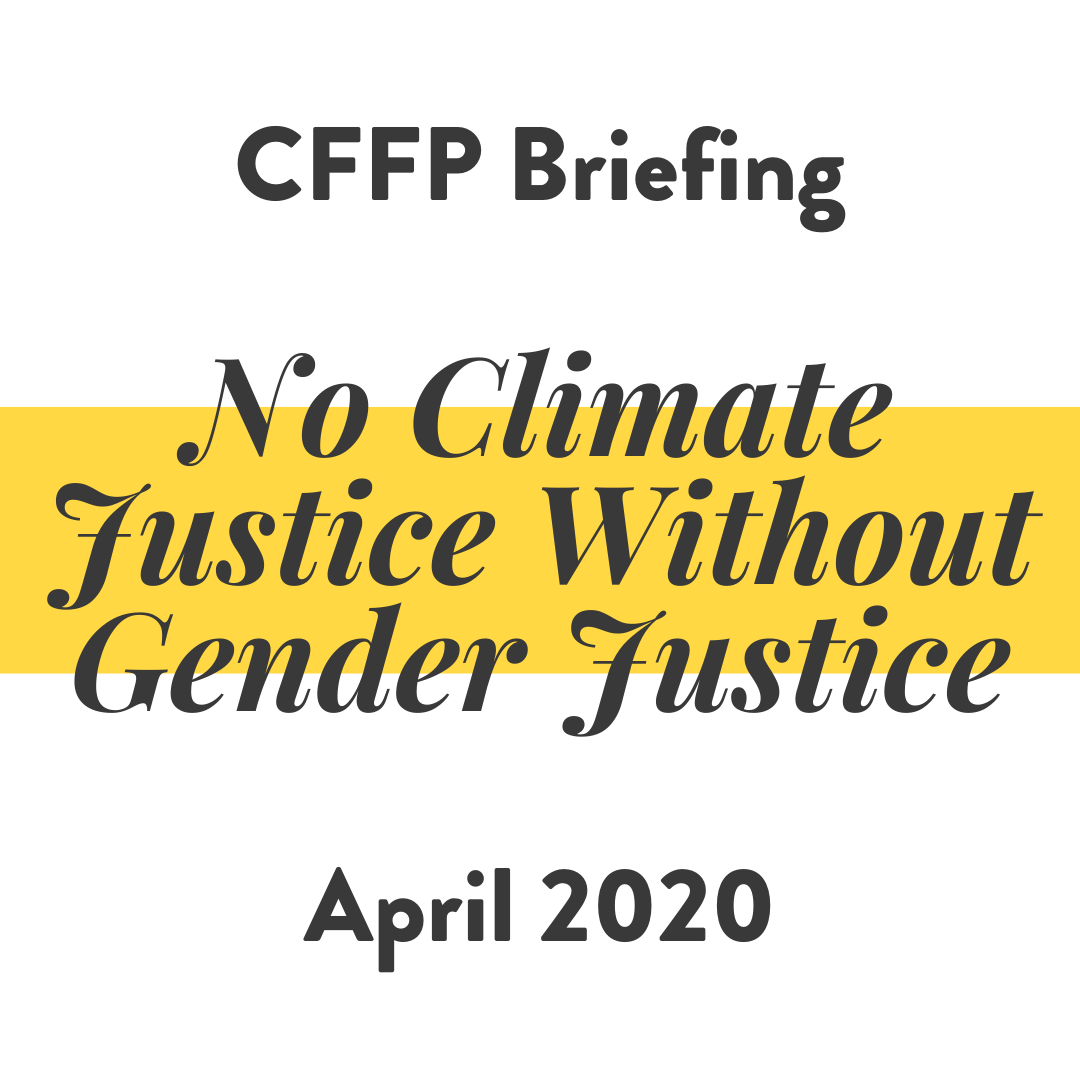Background
What is climate justice?
While the international community is struggling to find a common strategy to tackle climate change and make the fight against it a priority, many people are already experiencing severe climate-induced changes in their everyday life. The climate crisis hits hardest where people are already dealing with inequality and discrimination.
The climate crisis brings forth inherent global injustices, with already marginalised groups bearing the brunt of rising sea levels, droughts, and pollution. The actual realities of people experiencing climate change are often overlooked. Women and children, Black, Indigenous and People of Colour (BIPoC), LGBTQIA+ communities, people with disabilities and many more lack a seat at environmental decision-making and negotiation tables, and this must change. Mostly women, especially Black, Indigenous and Women of Colour (BIWoC), have been at the forefront of fighting for climate justice around the globe without receiving recognition or being considered partners on decision-making levels. Including all voices into environmental decision-making process is key for an intersectional feminist perspective on climate justice. Intersectional feminist research has much to contribute to analysing and solving the climate crisis. For decades, feminists have focused on the overlapping and multiple forms of oppression people are facing and revealed the interconnectedness of the social, political, economic, and environmental challenges ahead.
The climate crisis – fuelled by neoliberal-markets - often turns a blind eye on several aspects: colonial legacies of exploitation, alternative ways of knowing, responsibilities, already operating facts of the climate crisis and that while win-win scenarios are pursued, a lot of people are already losing. By acknowledging structural inequalities, we are eager to lay the groundwork for intersectional and effective climate action that benefits all.
Key Activities
Event Series: CFFP x Ban Ki-moon Centre for Global Citizens: Climate Justice 4 All
Since the beginning of 2021, CFFP and the Ban Ki-moon Centre for Global Citizens, have been working on this project: a series of 7 webinars throughout the year 2021 aiming at empowering activists, academia, policymakers and civil society in using climate advocacy and implementation strategies in the framework of the SDGs through an intersectional feminist lens. Each event spoke to different target audiences and focused on knowledge exchange, joint learning, the creation of safe spaces and networking. Just in time for COP26 we are delighted to have finalised this project, highlighting the voices of young activists, valuing different ways of knowing and knowledge production, acknowledging that it's especially already marginalised people like Black, Indigenous and People of Colour (BIPoC), low-income people, people located in the so-called Global South and LGBTQI+ individuals that are threatened by the climate crisis.
We hope to see many of the topics discussed in our webinars also being discussed at COP26. But, as we know we cannot rely on this to happen, we especially hope that this video, these webinars, are somehow an appreciation for the tremendously incredible work activists all over the world are doing and an encouragement to keep going.
Resources
Briefing: Feminist Foreign Policy and Climate-Induced Migration
Climate change due to global warming represents one of the greatest challenges to humankind today. While industrialised countries and multinational corporations are largely responsible for the current climate crisis, the effects of climate change are felt most severely by people who contribute the least to the acceleration of global warming (communities in the global South and low-income communities in the industrialised North). With current international law having no system to address this, this briefing calls for a Feminist Foreign Policy framework to be adopted in the handling of the climate emergency; and for organisations to help address this gap in protections for women, BIPOC, and other marginalised communities disproportionately displaced due to climate change.
Briefing: No Climate Justice Without Gender Justice!
The climate crisis is not only an issue of science and technology but also of fairness and justice. Those who contribute the least to the climate crisis are often the ones most impacted by it. It is impossible to fully understand its causes and impacts without taking gender into consideration.
Event Series Report: CFFP x 1014: New Approaches to Foreign Policy - Feminist Foreign Policy and Its Potential for Advancing Transatlantic Relations
Considering the on-going security crises, the global pushback against human rights, and the climate emergency, the transatlantic partnership is more crucial than ever. This event series aimed at increasing the dialogue between both sides of the Atlantic and fostering awareness about more sustainable approaches to foreign policy. It discussed transatlantic priorities in the fields of security, sexual and reproductive health and rights, and climate justice from a Feminist Foreign Policy perspective. Read our summary of the series here!
Resource Page: Climate Justice
We have compiled a list of essential resources on all things intersectional, feminist climate justice! Check it out now.
Events
Instagram Live: Feminist Foreign Policy and Climate-Induced Migration
Watch back our Instagram Live Q&A on Feminist Foreign Policy and Climate-Induced Migration with CFFP’s Junior Researcher, Alex Fox!
Feminist Foreign Policy and Climate Justice
In our understanding, Feminist Foreign Policy - dedicated to human security and putting people’s safety over the safety of states - acknowledges the climate crisis as a security issue and thus commits to fighting all factors directly and indirectly contributing to climate change. Only by striving for intersectional climate justice and accepting how the climate crisis already threatens and destroys livelihoods and makes people, especially marginalised communities, unsafe, we can achieve justice and security for everyone in the long run. Together with former Irish president and climate justice advocate Mary Robinson and Ugandan activist, feminist and environmentalist Dorothy Nalubega, we will discuss how to implement international climate agreements with an intersectional feminist approach, challenge the climate crisis as a parameter for conflict and migration and ways for Feminist Foreign Policy as means to rebalance power inequalities in the fight against climate change.
This webinar is a part of our ‘Climate Justice 4 All’ webinar series hosted in partnership with the Ban Ki-moon Centre for Global Citizens.
Climate Justice: From Theory to Praxis (Climate Justice Implementation Strategies and Best Practices)
This session will emphasise climate movements as well as traditional ecological knowledge and will investigate the role of social justice when tackling the climate emergency. During the webinar, participants will be introduced to the landscape of diverse projects tackling climate change with an intersectional approach. Gathering new ideas, implementation strategies and improving already existing environmental programs or movements lies at the heart of this session.
This webinar is a part of our ‘Climate Justice 4 All’ webinar series hosted in partnership with the Ban Ki-moon Centre for Global Citizens.
Climate Justice and Gender Justice: Addressing the Climate Crisis with an Intersectional Feminist Approach
Social movements like the 350 and Fridays for Future have become strong voices holding administrations accountable for enforcing international agreements such as the Paris Climate Agreement. These agreements are under threat, gendered and racialised inequalities of the climate crisis are too often neglected, both within and between nations, and the COVID-19 pandemic seems to overshadow the climate commitments on both sides of the Atlantic.
How does the climate crisis impact the current societal structures, both within and among nations? How can we use the climate crisis as an opportunity to reshape power structures? How is the fight for climate justice interconnected with the fight for feminism and how can a Feminist Foreign Policy address the current climate emergency?
These crucial questions were explored during the final event of our webinar series with 1014.
Climate Justice: Theory & Groundwork (An Introduction to Intersectional Thought and the Interconnectedness of the Climate Crisis, Systemic Inequality, and Marginalised Climate Activism)
The climate crisis is more than global warming and the need to produce less carbon dioxide. It works as a multiplier of inequality, threatening and worsening the living conditions of already marginalised people. The aim of this event was to highlight the importance of fostering climate justice from an intersectional perspective, tackling racial, social, economic, health and environmental injustice altogether.
This webinar is a part of our ‘Climate Justice 4 All’ webinar series hosted in partnership with the Ban Ki-moon Centre for Global Citizens.










